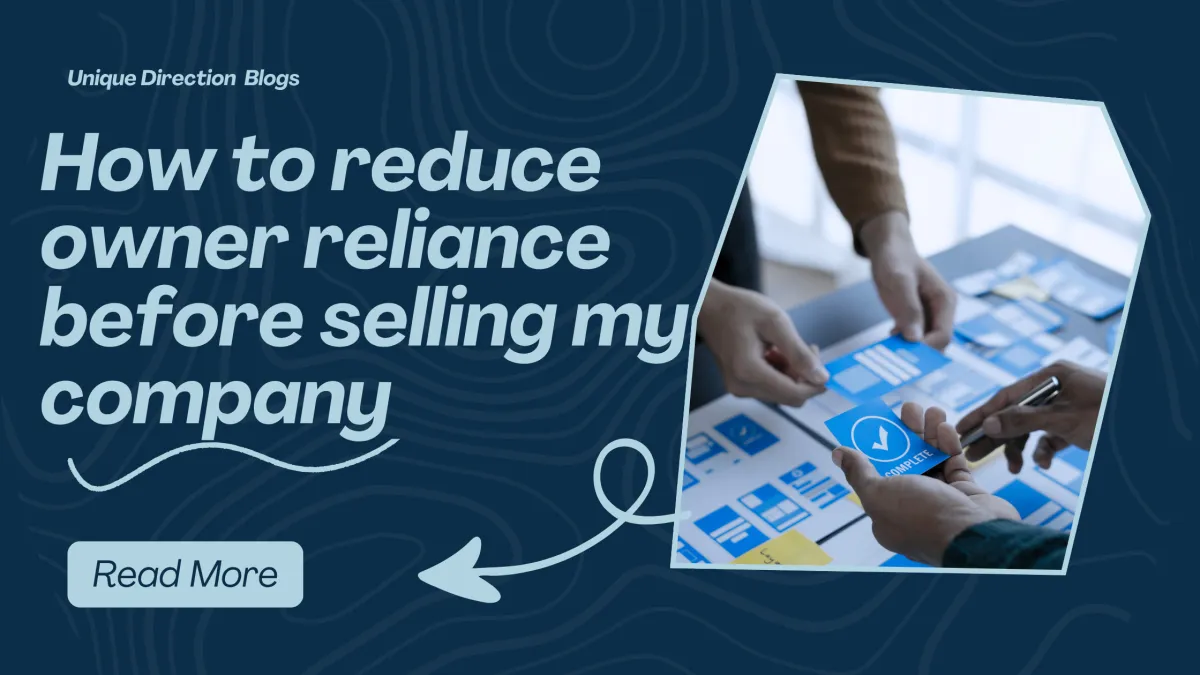
How to reduce owner reliance before selling my company
If your business depends on you…
It’s not ready to be sold.
That’s not an insult — it’s a buyer’s lens.
Founders often underestimate how tightly the business is wrapped around them.
And when a buyer sees that, they see risk.
Because even if your numbers look good, the question they’re really asking is:
"What happens when you leave?"
And if the answer is “things might slow down…”
You’re going to face price pressure. Or worse, no deal at all.
Why Owner Reliance Kills Deals
When a business leans too heavily on the founder, buyers worry about:
Continuity risk — Will customers or staff stay once you're gone?
Knowledge gaps — Are critical processes undocumented or improvised?
Bottlenecks — Do decisions get stuck waiting for you?
To a buyer, this all looks fragile.
And fragile businesses don’t attract strong offers.
How to Know if You’re the Bottleneck
Ask yourself:
Could the business run for 4–6 weeks without you?
Do clients insist on speaking to you personally?
Are you involved in every major decision or firefight?
Do you approve most spending, pricing, or hiring?
If you answered “yes” to more than one — your business has an owner reliance issue.
DIY Steps to Reduce Owner Reliance
Here’s how to start untangling yourself without disrupting the day-to-day:
1. Define and Delegate Key Functions
Map out the core business functions — sales, operations, finance, delivery, etc.
Assign ownership of each area to a senior team member.
2. Systemise Your Decision-Making
Create rules, not exceptions.
Instead of “ask me every time,” give your team frameworks and criteria to decide on their own.
3. Document the ‘How’
Start building your Operations Playbook.
Write down what’s in your head — processes, vendors, client onboarding steps, approval flows.
4. Build a Visible Leadership Layer
Let your managers take credit. Step back from being the face of everything.
This builds buyer confidence in team continuity.
5. Shift Relationships Strategically
Start introducing senior team members to key clients.
Let them own the relationship — slowly, deliberately, and visibly.
Unique Direction's USP:
BuyerLens Business Audit
At Unique Direction, we help founders diagnose exactly where they’re holding the business back — and how that affects valuation.
Through our BuyerLens Business Audit, we:
Identify the specific tasks, decisions, and relationships too reliant on you
Highlight high-risk areas buyers are most likely to flag
Give you a structured, prioritised plan to delegate, document, and de-risk
Show you how this improves your exit value — not just your workload
Why It Matters
Reducing owner reliance doesn’t just make your business more valuable.
It also makes it more sellable.
Because even if the numbers look strong, a buyer won’t pay a premium for a business that collapses without you.
The less central you are, the stronger your deal position becomes.
Final Word
The best exits happen when you’re no longer the glue holding it all together.
That doesn’t mean walking away — it means building a business that could run without you, even if you don’t leave yet.
And that’s when buyers take notice.
Next Read
1.When is the right time to sell my company?
2.Steps to sell a business successfully
3.How can I increase the value of my company before selling?
